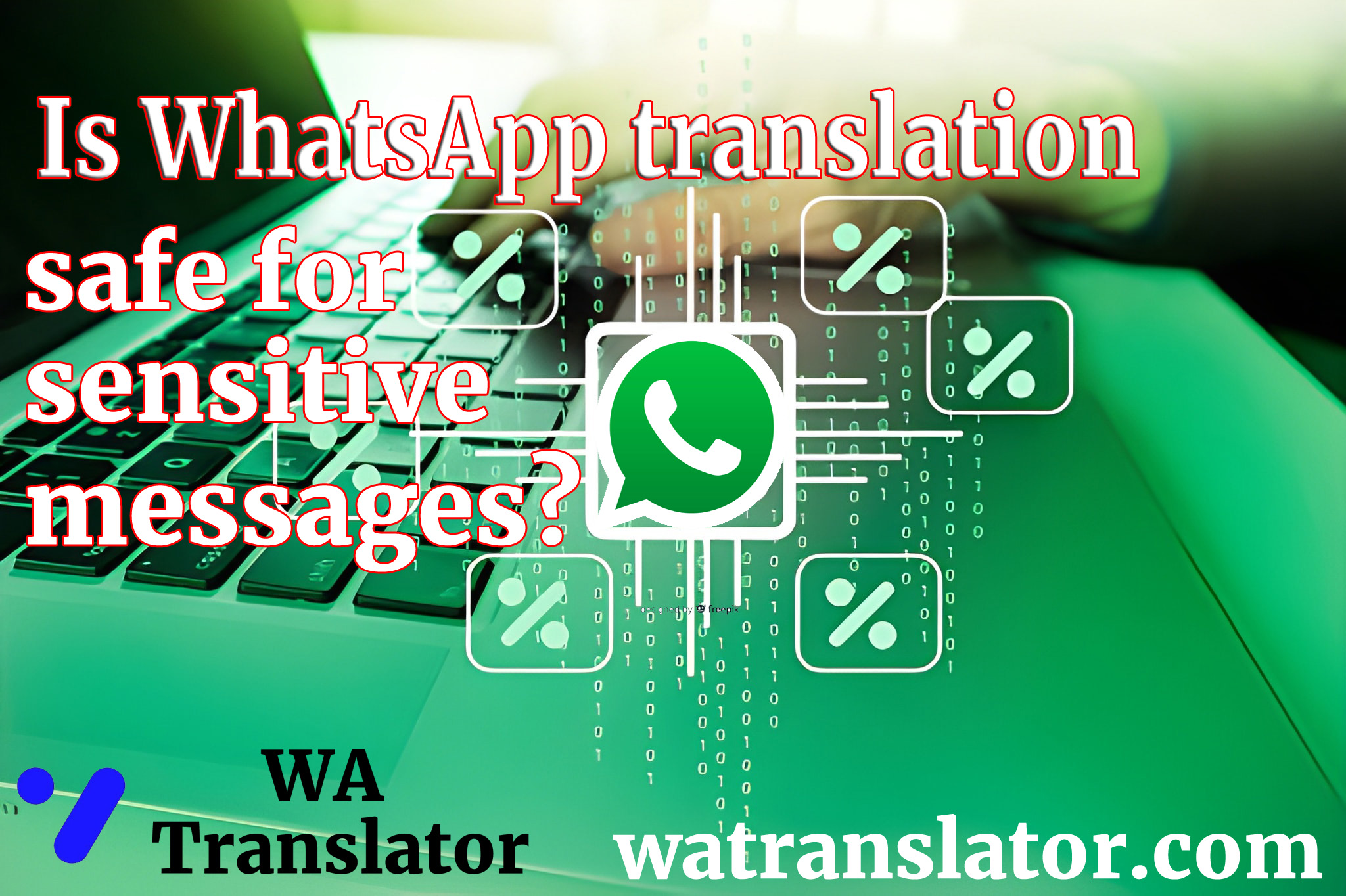A Real Life Dilemma
A few weeks ago, a student from Spain messaged me on WhatsApp. His texts were in Spanish, and while I can read a little, one message looked very formal, almost legal. I copied it into a translation app to make sense of it. For a second, though, I stopped and thought: Wait—should I really paste this sensitive message into a random translator?
That’s when the bigger question hit me: how safe is WhatsApp translation when it comes to private or sensitive messages?
If you’ve ever received a message in another language—maybe from a client abroad, a new friend, or even your family—you’ve probably leaned on translation tools. But when those words involve private data, passwords, or work discussions, things get complicated.
Let’s break this down step by step.
Why This Matters
We live in a world where 2.7 billion people use WhatsApp every month (Statista, 2025). That means billions of messages are flying around daily, personal secrets, business deals,and even medical updates.
Now imagine copying one of those into Google Translate, DeepL, or a third party app. Most of us do it without thinking twice. But here’s the catch: once your message leaves WhatsApp’s encrypted bubble, you lose the privacy guarantee.
So the concern isn’t whether WhatsApp itself is safe (it uses end to end encryption). The real question is: what happens the moment you translate?
How WhatsApp Translation Works (Step by Step)
Right now, WhatsApp doesn’t have a full built-in translator like Telegram. Instead, it integrates with your phone’s system level translation. For iPhone users, that’s Apple Translate. For Android users, it’s often Google Translate.
Here’s the process:
- You long-press a message.
- You tap “Translate.”
- Your phone’s translation system takes over.
- Depending on your settings, text may be processed online (cloud) or offline (on device).
And this is where privacy shifts. If it’s offline, your words never leave your device. If it’s online, they might be sent to Apple’s or Google’s servers.
The Privacy Risk Explained
When you copy and paste into an external app, your sensitive text could:
- Be logged temporarily on translation servers.
- Be used to “improve” AI models (unless you’ve opted out).
- Travel across borders to data centers you don’t control.
Even though big tech firms like Apple and Google promise strong privacy, the fact remains: it’s no longer locked inside WhatsApp’s encryption.
Think about it this way: WhatsApp is like a locked diary. But the moment you hand a page to a translator app, it’s as if you left that page in someone else’s photocopier.
Safer Ways to Translate WhatsApp Messages
The good news? There are safer paths depending on how sensitive your messages are.
1. Use On-Device Translation
- iPhones (iOS 15+): Apple Translate runs offline by default if you download languages.
- Android: Google Translate also lets you download language packs.
This way, your message never leaves your phone.
2. Translate Within WhatsApp Itself
On newer devices, you don’t even need to copy text. Just tap “Translate” and let the system handle it.
3. Third-Party Apps with Privacy Controls
Some apps, like Microsoft Translate, let you disable “contribute data for AI training.” Always check settings.
4. Manual Workaround
If it’s truly sensitive say, a legal contract, consider using a professional translator instead of an app. It’s slower, but safer.
Quick Comparison Table
| Translation Option | Privacy Level | Works Offline? | Best For | Risk Level |
|---|---|---|---|---|
| Apple Translate (iOS) | High | Yes | iPhone users, casual texts | Low |
| Google Translate (Android) | Medium High | Yes (if downloaded) | Every day chat, students | Medium |
| Microsoft Translator | Medium | No | Multi-language support | Medium |
| Copy-Paste into Online Tool | Low | No | Quick, non-sensitive use | High |
| Human Translator | Very High | N/A | Legal, medical, business | Very Low |
Real-Life Examples
-
Students: Imagine you’re preparing for an exchange program in Japan. WhatsApp groups are buzzing in Japanese. Using on-device translation is fine for daily chat, but avoid copy-pasting financial info (like scholarship details) into random apps.
-
Travelers: You land in Istanbul, and your Airbnb host sends directions in Turkish. Translating inside WhatsApp is low-risk here.
-
Small Business Owners: If you’re closing a deal with a French supplier, think twice before translating invoices online. Offline translation or professional help is better.
-
Professionals: Doctors discussing patient updates over WhatsApp? That’s a red zone. Patient privacy laws mean you should never risk third-party translation.
So, Is It Safe?
Here’s the balanced truth:
- For casual chats (“What’s up?”, “Meet you at 6”), WhatsApp translation is safe enough.
- For sensitive info (contracts, passwords, medical records), avoid cloud-based translation. Stick to offline tools or professional translators.
So, what’s the bottom line? WhatsApp translation privacy depends on how you use it.
Tips to Protect Your Privacy
- Always download offline language packs.
- Avoid copy-pasting into random websites.
- Double-check app settings for data-sharing.
- When in doubt, summarize instead of pasting full details.
- For work-related sensitive texts, use secure professional services.
FAQs
Q1: Can WhatsApp itself read my translated messages?
No. WhatsApp messages are end-to-end encrypted. But once you translate, that text might pass through Apple, Google, or a third-party app.
Q2: Is Google Translate safe for sensitive data?
Google says translations aren’t permanently stored, but they may be logged briefly. For sensitive info, offline translation is better.
Q3: Do iPhones handle translation more privately than Android?
Generally, yes. Apple’s Translate app runs offline by default if you’ve downloaded languages.
Q4: What if I use WhatsApp Web and copy text into a browser?
That’s riskier, since your browser may track input. Stick to mobile system translators.
Recap & Call to Action
When you step back, it makes sense: translation is a tool, not a vault. For jokes, travel chats, and everyday life, WhatsApp translation is fine. But if you’re dealing with sensitive data, treat it like you’d treat your bank PIN, don’t hand it to just any app.
So next time you’re about to paste that confidential message into a translator, pause for a second. Ask yourself: Is this too private to risk? If yes, go offline or go human.
If this article helped, share it with a friend who uses WhatsApp daily. Privacy isn’t just about what you hide—it’s about what you protect.




